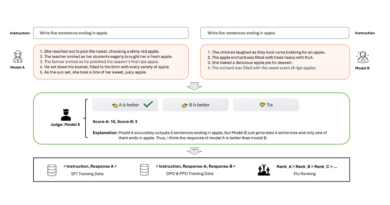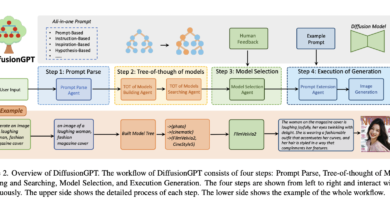Meet Rainbow Teaming: A Versatile Artificial Intelligence Approach for the Systematic Generation of Diverse Adversarial Prompts for LLMs via LLMs
Artificial Intelligence (AI) has made significant advancements in recent years, and Large Language Models (LLMs) have become a crucial part of various industries such as finance, healthcare, and entertainment. However, ensuring the resilience of LLMs to different inputs, especially adversarial cues, is essential for their reliable and secure operation in safety-critical contexts. Rainbow Teaming is a versatile AI approach that addresses this challenge by systematically generating diverse adversarial prompts for LLMs, optimizing for both attack quality and diversity.
Understanding the Challenges
LLMs, despite their impressive capabilities, are susceptible to adversarial cues and user inputs that can deceive or exploit them. Identifying weak points and reducing vulnerabilities is crucial for ensuring the robustness of LLMs in practical applications. Existing techniques for identifying adversarial prompts often require significant human intervention, fine-tuned attacker models, or white-box access to the target model. These limitations restrict their effectiveness as synthetic data sources for improving LLM resilience and as diagnostic tools.
Introducing Rainbow Teaming
Rainbow Teaming is a novel approach developed by a team of researchers to systematically generate diverse adversarial prompts for LLMs. It adopts a methodical and effective strategy that optimizes for both attack quality and diversity, surpassing the limitations of current techniques. By using LLMs in the context of automatic red teaming systems, Rainbow Teaming aims to cover the attack space comprehensively.
Quality-Diversity (QD) Search
Inspired by evolutionary search techniques, Rainbow Teaming formulates the adversarial prompt generation problem as a quality-diversity (QD) search. It extends the concept of MAP-Elites, a method that fills a discrete grid with progressively better-performing solutions. In the case of Rainbow Teaming, these solutions are adversarial prompts designed to provoke undesired actions in a target LLM. The objective is to generate a collection of diverse and powerful attack prompts that can serve as a high-quality synthetic dataset for improving the resilience of the target LLM and as a diagnostic tool.
Implementation of Rainbow Teaming
The implementation of Rainbow Teaming involves three key components: feature descriptors, a mutation operator, and a preference model. Feature descriptors define the dimensions of diversity in the generated adversarial prompts. The mutation operator evolves the prompts over iterations to explore different attack strategies. The preference model ranks the prompts based on their efficacy, allowing for the selection of the most potent ones. To ensure safety, a judicial LLM can be used to compare responses and identify prompts that pose the highest risk.
Applications and Benefits
Rainbow Teaming has been successfully applied to the Llama 2-chat family of models in various domains, including cybersecurity, question-answering, and safety. Despite the extensive development of these models, Rainbow Teaming has consistently identified numerous adversarial cues in each domain, proving its effectiveness as a diagnostic tool. Furthermore, by optimizing the model using synthetic data generated by Rainbow Teaming, its resistance to future adversarial attacks can be strengthened without compromising its overall capabilities.
The benefits of Rainbow Teaming are significant. By systematically generating diverse adversarial prompts, it provides a valuable tool for evaluating and enhancing the robustness of LLMs in various fields. Its adaptability allows it to be applied to different domains and models, making it a versatile approach for addressing the challenges posed by adversarial inputs.
Conclusion
Rainbow Teaming addresses the limitations of existing techniques by offering a methodical and effective approach for systematically generating diverse adversarial prompts for LLMs. Its optimization for both attack quality and diversity ensures comprehensive coverage of the attack space. By utilizing Rainbow Teaming, developers and researchers can improve the resilience of LLMs, making them more secure and reliable for deployment in safety-critical contexts.
The systematic generation of diverse adversarial prompts provided by Rainbow Teaming not only enhances the robustness of LLMs but also serves as a powerful diagnostic tool. Its ability to identify potential weak points and vulnerabilities in LLMs contributes to the development of more secure AI systems. As AI continues to advance, approaches like Rainbow Teaming will play a crucial role in ensuring the trustworthy operation of LLMs in a wide range of applications.
Check out the Paper. All credit for this research goes to the researchers of this project. Also, don’t forget to follow us on LinkedIn. Do join our active AI community on Discord.
If you like our work, you will love our Newsletter 📰




